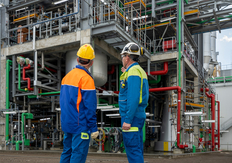- The new plant increases global alkyl ethanolamines capacity by nearly 30% to over 140,000 tons per year.
- Key chemicals produced include dimethyl ethanolamine (DMEOA) and methyl diethanolamine (MDEOA).
- The plant is part of a network including sites in Germany, Belgium, Louisiana, and China.
- Alkyl ethanolamines are used in gas treatment, water treatment, and coatings.

New Production Capacity
BASF has inaugurated a new world-scale production plant for alkyl ethanolamines at its Verbund site in Antwerp, Belgium. This investment increases the company’s global annual production capacity for alkyl ethanolamines, including dimethyl ethanolamine (DMEOA) and methyl diethanolamine (MDEOA), by nearly 30 percent to over 140,000 tons per year.
Global Production Network
The new plant is an integral part of BASF’s production network for alkyl ethanolamines, which includes sites in Ludwigshafen, Germany; Antwerp, Belgium; Geismar, Louisiana; and Nanjing, China. This expansion aims to support sustainable growth and meet increasing global demand.
Applications of Alkyl Ethanolamines
Alkyl ethanolamines are versatile chemicals used primarily as precursors for gas treatment chemicals, flocculants in water treatment, and binders between pigments and resins in the coatings industry. They also find applications in fabric softeners, metalworking fluid additives, and polyurethanes.
Diverse Amines Portfolio
BASF offers approximately 300 different amines, making it the company with the world’s most diverse portfolio of these chemical intermediates. This includes alkyl-, alkanol-, and alkoxyalkylamines, as well as heterocyclic, aromatic, and specialty amines. The portfolio also features an expanding range of chiral amines, known for their high optical and chemical purity. These products are used in manufacturing process chemicals, pharmaceuticals, crop protection products, cosmetics, detergents, coatings, special plastics, composites, and special fibers.

